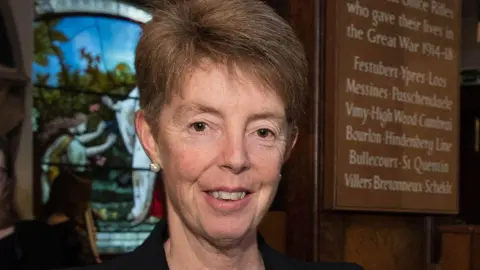Five questions for ex-Post Office boss Paula Vennells
 Alamy
AlamyThe former boss of the Post Office, Paula Vennells, is giving evidence on Wednesday at the public inquiry into the Horizon IT scandal.
It is a major investigation into how hundreds of sub-postmasters were wrongly prosecuted starting in 1999 after faulty software said money was missing from Post Office branch accounts.
Ms Vennells was chief executive from 2012 to 2019. During this time, sub-postmasters were still being prosecuted but the Post Office continued to deny the faulty Horizon software was to blame, despite mounting evidence of wrongful convictions.
This will be the first time Ms Vennells has spoken publicly about what happened in almost a decade. She will be grilled for three days. So, what are some of the key questions she has to answer?
When did she know accounts could be accessed remotely?
The Post Office always claimed sub-postmasters' branch accounts could not be remotely accessed without their knowledge. Prosecutions were done on the basis that the accounts were secure. Once it became known that Fujitsu, the company responsible for the Horizon system, was able to do this, it undermined every prosecution case and civil claim the Post Office had brought.
We now know that the Post Office was made aware as early as 2010 about this secret “back door” access. We also know that in 2015, Paula Vennells wrote a memo to colleagues saying she needed to be able to say, “No, this isn’t possible.”
At the time, she was preparing for an important appearance in front of MPs, as the pressure grew for the Post Office to come clean about the scale of the problems. So when exactly did she know the truth about remote access?
Did she lie to Parliament in 2015?
Paula Vennells went on to tell MPs on the business select committee in 2015 that she had seen no evidence of any miscarriages of justice.
But two years earlier barrister Simon Clarke warned the Post Office there were problems with past prosecutions. He said this was because they’d relied on evidence from Gareth Jenkins, the Fujitsu IT engineer who failed to disclose to the courts that he knew about bugs in the system.
Mr Clarke wrote that this left the Post Office in breach of its duty as prosecutor.
Lord Arbuthnot, one of the leading campaigners for the sub-postmasters, says Ms Vennells must have known about the advice. “It does make you wonder what reassurances, if any, had she been given, and by whom, before she said what she said on public record.”
Why didn’t she do more to find out what was going on?
When Ms Vennells, who was also a part-time Anglican priest, became chief executive, the business was haemorrhaging money. She was under pressure to modernise the business and make it profitable. Horizon was too big and important to fail.
Nick Wallis, author of the Great Post Office Scandal, believes Ms Vennells didn’t want to be given bad information. “I think she relied on Post Office loyalists and highly paid legal advisers to tell her the truth she wanted to hear.”
It's clear there were plenty of missed opportunities along the way. In 2012, under pressure from sub-postmasters and MPs, forensic accountants Second Sight were appointed to look into the growing number of complaints.
Second Sight played a key role in exposing the scandal, finding flaws in the Horizon computer system but Post Office bosses secretly decided in April 2014 to sack the firm, documents obtained by the BBC showed.
Why did she allow the Post Office to fight sub-postmasters in court?
Ms Vennells defended the Horizon system right to the end. After a mediation scheme to help victims collapsed, sub-postmasters launched an epic High Court battle to get to the truth.
This was the fight for justice launched in 2017 by Alan Bates and a group of 555 sub-postmasters which inspired ITV drama Mr Bates vs The Post Office.
Ms Vennells was in charge when the Post Office decided to defend the action, going on to spend £100m fighting the group in court despite knowing its defence was untrue, a draft report uncovered by the BBC showed. The Post Office said it would be "inappropriate" to comment on this report.
“They doubled down, rather than accept the reality,” says Paul Marshall, a barrister who represented several wrongly convicted branch managers. Ms Vennells left the Post Office just before the damning judgement came through.
Was anyone pulling her strings?
There’s one key bit of context to all this. The Post Office is owned by the government, which has a representative on its board.
There’s an awful lot we don’t know about what went on between ministers, top civil servants and the decision making during her leadership, a crucial phase when the alleged cover-up was in full swing.
How much did she tell them about the faults and the problems? And what were they telling her? Did Fujitsu mislead her?
Everyone touched by this terrible scandal now wants to hear the truth from Ms Vennells. In a statement from her solicitors she said: "I am truly sorry for the devastation caused to the sub-postmasters and their families, whose lives were torn apart by being wrongly accused and wrongly prosecuted as a result of the Horizon system."
She added: "I now intend to continue to focus on assisting the inquiry and will not make any further public comment until it has concluded."
